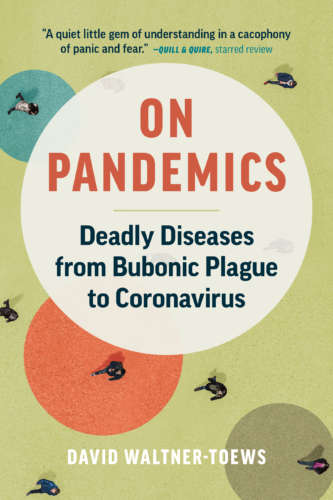 From COVID-19 to Ebola to West Nile virus, how diseases jump from animals to people is the topic of a new book being released this spring by a University of Guelph epidemiologist.
From COVID-19 to Ebola to West Nile virus, how diseases jump from animals to people is the topic of a new book being released this spring by a University of Guelph epidemiologist.
In On Pandemics: Deadly Diseases from Bubonic Plague to Coronavirus, professor emeritus David Waltner-Toews discusses human health threats posed by various zoonotic diseases and how a “one health” approach might help prevent future infectious outbreaks.
Originally published in 2007 as The Chickens Fight Back: Pandemic Panics and Deadly Diseases that Jump from Animals to Humans, the book has been updated for the current COVID-19 pandemic. Waltner-Toews said his publisher contacted him in March amid the coronavirus-induced lockdown to propose a new edition.
In the book’s introduction, he likens pandemics to earthquakes and volcanoes: we know they’re coming but not precisely when and where. He calls for experts in varied fields including public health, epidemiology, ecology and business to collaborate in anticipating and monitoring outbreaks. Because no single discipline, person or group can be aware of everything, he argues, this collaboration is needed to create a kind of “collective peripheral vision.”
In one new chapter, Waltner-Toews discusses the likely origins of COVID-19 as well as details of the 2003 SARS (severe acute respiratory syndrome) epidemic and an outbreak of Nipah virus in the late 1990s.
He attributes the emergence of the new coronavirus in late 2019 to devastating animal disease outbreaks in pigs and poultry in China. These outbreaks created meat shortages just as consumers were looking to stock up on food for Chinese New Year celebrations.
As with SARS and MERS (Middle East respiratory syndrome), the new coronavirus is thought to have originated in bats and then adapted to other animals. Candidates for these intermediaries between bats and people have included civets, raccoon dogs and pangolins, or scaly anteaters, whose purported medicinal value makes them the most highly trafficked wild animal in the world.
Many of the book’s other chapters – updated from the original edition – discuss infections ranging from plague and rabies to the H1N1 pandemic of 2009-10 and the 2013-16 epidemic of Ebola in West Africa. Waltner-Toews shares first-hand observations from his international research into zoonotic diseases such as sleeping sickness in Uganda, avian influenza in Southeast Asia and tapeworm infestations in Nepal. He also writes about outbreaks in Canada, including how restructuring of our urban and rural landscapes facilitated the spread of diseases such as West Nile virus and Lyme disease.

In his concluding chapter, he urges readers to look beyond physical distancing and hygiene – as vital as those basic practices have proven for combatting the novel coronavirus – toward wider ecological, economic and political factors that help account for the spread of numerous zoonotic diseases.
Waltner-Toews says effects of climate change, agricultural and food production practices, loss of biodiversity and growing world trade and travel bring humans, animals and their associated microbes into closer contact. Those changes make ideal conditions for sparking and spreading epidemics like COVID-19.
He suggests that approaches integrating the health of humans, animals and environment such as one health and ecohealth work best when international collaboration and open information-sharing are fostered across multiple disciplines.
“We’re the ones using the food and other products that are used to justify destruction of habitats in Africa, Latin America and Asia. If we’re going to keep trading, we have a global responsibility to work with people in other countries to address those ecological issues in their countries.”
He believes there’s an upside to the global pandemic.
Referring to worldwide lockdowns and social and economic turmoil caused by COVID-19, he said, “This gives us a chance to rethink how we organize our economic relationships and the ecological webs that link everything from resource extraction in West Africa and food safety in Europe to reliance on electronic devices everywhere.
“We have an opportunity to reorganize and renew ecological and social relationships that we haven’t had for decades, probably since the 1918 influenza pandemic. It would be a tragedy to let this opportunity slip away.”
Contact:
Prof. David Waltner-Toews
dwaltner@uoguelph.ca